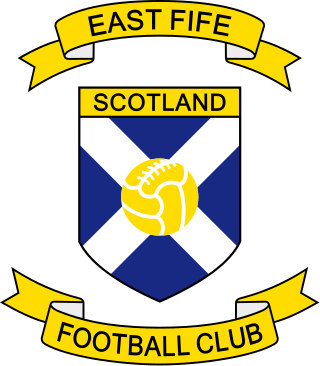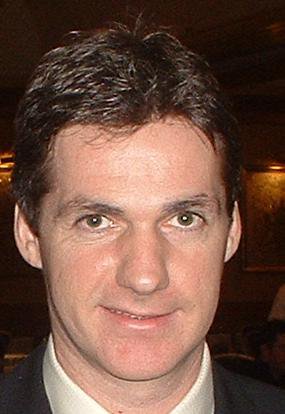Related Research Articles

Rangers Football Club is a Scottish professional football club based in the Govan district of Glasgow which plays in the Scottish Premiership. Although not its official name, it is often referred to as Glasgow Rangers outside Scotland. The fourth-oldest football club in Scotland, Rangers was founded by four teenage boys as they walked through West End Park in March 1872 where they discussed the idea of forming a football club, and played its first match against the now defunct Callander at the Fleshers' Haugh area of Glasgow Green in May of the same year. Rangers' home ground, Ibrox Stadium, designed by stadium architect Archibald Leitch and opened in 1929, is a Category B listed building and the third-largest football stadium in Scotland. The club has always played in royal blue shirts.

East Fife Football Club is a semi-professional football club established in 1903 in Methil, Fife, Scotland. They are members of the Scottish Professional Football League and compete in Scottish League Two, the fourth tier of the Scottish football league system.

James Edward McGrory was a Scottish footballer who played for Celtic and Clydebank as a forward and then went on to manage Kilmarnock before returning to Celtic as manager after the end of the Second World War.

Kilsyth Rangers Football Club are a Scottish football club based in the town of Kilsyth, North Lanarkshire. Nicknamed The Wee Gers, they were formed in 1913 and play at Duncansfield Park, which used to be one of the bigger non-league football grounds in Scotland. They wear blue tops and shorts, the away strip being red tops, black shorts and black socks, and currently compete in the West of Scotland League Second Division.
Charles Nicholas is a Scottish former professional footballer. A striker, Nicholas is best known for his spells at Celtic and Arsenal. He won 20 international caps for Scotland, including playing at the 1986 FIFA World Cup.
Robert Lowe McPhail was a Scottish professional footballer, who played for Airdrieonians, Rangers and represented Scotland.

Celtic Football Club was constituted in 1888 with the purpose of creating a club for Irish Immigrants. Celtic play home games at Celtic Park, having moved there from their original ground in 1892. The club has always competed in the highest level of football in Scotland, currently the Scottish Premiership, since the inception of league football in Scotland. Celtic quickly established itself as a dominant force in Scottish football, winning six successive league titles during the first decade of the 20th century. A fierce rivalry developed with Rangers, and the two clubs became known as the Old Firm.
The 2006–07 Scottish Premier League season was the ninth season of the Scottish Premier League. It began on 29 July 2006.
The 2002–03 Scottish Premier League was the fifth season of the Scottish Premier League (SPL), the top level of football in Scotland. It began on 3 August 2002 and concluded on 25 May 2003.
Patrick Travers was a Scottish football player and manager in the first half of the 20th century. He played for many clubs in his native Scotland and for Barnsley in England, before becoming involved in coaching, and later, management, winning the Scottish Cup with Clyde on two occasions either side of World War II.

Joseph Miller is a Scottish retired footballer and a former manager of Scottish Football League club Clyde.
John McKenzie was a Scottish footballer who played as an inside right. He played in the Scottish Football League's top division for four clubs over nine consecutive seasons – Third Lanark, Heart of Midlothian, Aberdeen and Ayr United – before his career was curtailed by World War II.
Season 2006–07 was a mixed season for Hibernian; their league form suffered from extended cup runs, and they eventually finished sixth. The reward for their cup form was a first trophy in 16 years, thrashing Kilmarnock 5–1 in the final to lift the CIS Cup. Hibs were knocked out of the Scottish Cup in a semi-final replay by Dunfermline.
Aberdeen Football Club are one of Scotland's most successful football teams, with 17 major domestic trophy wins: four League titles with 17 runners-up finishes, seven Scottish Cups with nine final defeats, and six Scottish League Cups with nine final defeats. They are the only Scottish team to have won two European trophies – the European Cup Winners' Cup against Real Madrid on 11 May 1983 and the European Super Cup against the European Cup holders Hamburger SV in December 1983.
James Soye was a Scottish professional footballer who played as an inside-forward for various clubs in Scotland, Ireland and England in the period prior to World War I.
Season 2003–04 was a disappointment for Hibernian, as the team again finished in the bottom half of the Scottish Premier League, and was knocked out at the first stage of the Scottish Cup. The main highlight of the season was the run to the 2004 Scottish League Cup Final, which Hibs reached by defeating both halves of the Old Firm. This also ended in disappointment, however, as the Final was lost 2–0 to Livingston. A month after that defeat, manager Bobby Williamson was allowed to leave the club to manage Plymouth Argyle.
Robert Kirk was a Scottish footballer best known for winning five senior trophies with Heart of Midlothian in the late 1950s and early 60s. He also played for Dunfermline Athletic and Raith Rovers.
Declan Patrick Gallagher is a Scottish professional footballer who plays as a centre-back for Scottish Championship club Dundee United and the Scotland national team.
The Aberdeen–Rangers rivalry refers to football matches and related activity involving the Scottish football clubs Aberdeen F.C. and Rangers F.C.
"Nine in a row" is a topic which has dominated football in Scotland at club level since the 1970s. The term refers to one club winning the national league championship nine times in a row, a feat which was first set by Celtic between the 1965–66 and 1973–74 seasons, during which they also became European champions in 1967. Their run was eventually stopped by local rivals Rangers, who later received significant financial investment and matched the achievement between 1988–89 and 1996–97 – Celtic were the team to win the next title and prevent their record being broken. After the two Glasgow clubs, known collectively as the Old Firm due to their longstanding domination of Scottish football and the mutual economic benefits of this rivalry, exchanged the trophy regularly for 14 seasons, Celtic then went on another run of championships from 2011–12 to 2019–20; however Rangers, who had been out of the top division for four seasons of that period after their commercial body was liquidated, managed to strengthen sufficiently to 'stop the 10' with a dominant, unbeaten season.
References
- 1 2 3 George Thomson, AFC Heritage Trust
- ↑ "Celtic 2–1 Aberdeen, Scottish Cup Final (contemporary newspaper scans)". 24 April 1937. Retrieved 7 August 2020– via The Celtic Wiki.
- ↑ (Rangers player) Thomson, George R., FitbaStats
- ↑ John Litster (October 2012). "A Record of pre-war Scottish League Players". Scottish Football Historian magazine.
{{cite journal}}: Cite journal requires|journal=(help)